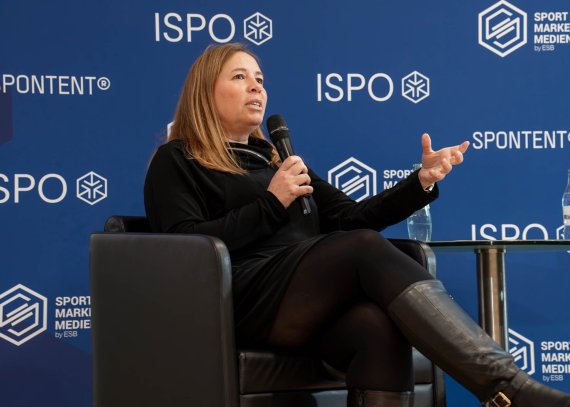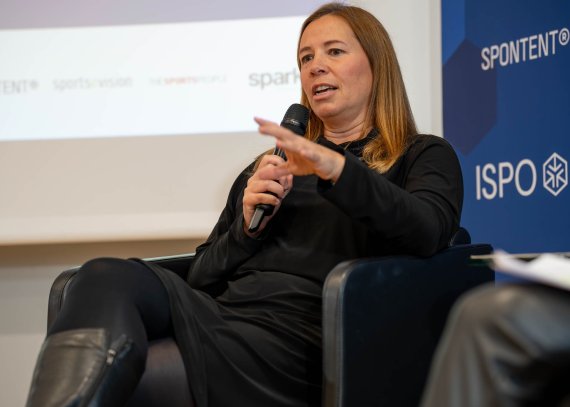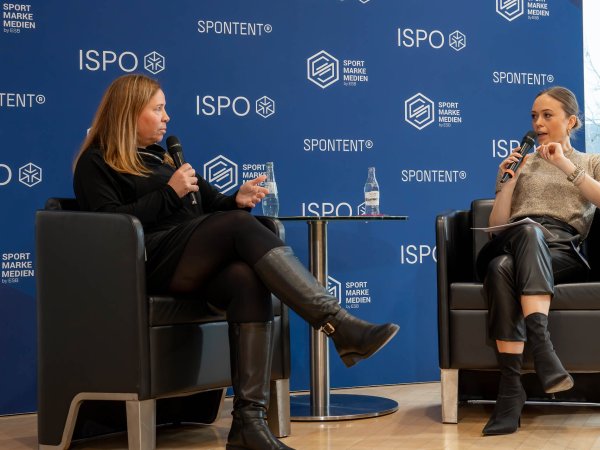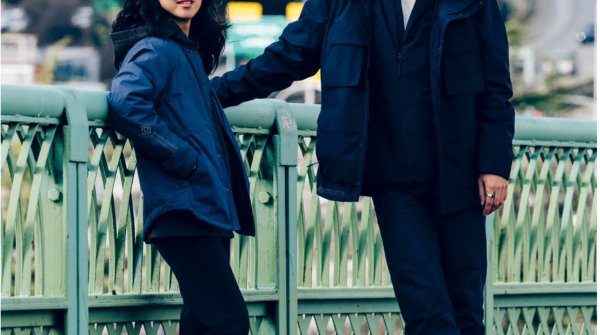A woman leading a global tennis tournament. Another being the only female voice in a boardroom. These aren’t everyday stories; they’re treated like rare wins. But why is that still the case? What’s holding women back? And what needs to change at the structural level for real equality to happen?
Kerstin Lutz, CEO of the Billie Jean King Cup Limited (previously called the Federation Cup), the top women’s tennis team competition and female counterpart to the Davis Cup, opens up about the quiet battles women still fight in sports management. She shares what’s changed, what hasn’t and why simply working hard isn't enough to change this. Through her story, from her early days in a male-dominated industry to her efforts building diverse teams, Lutz shows us that progress takes more than presence. It takes intention.
This talk isn’t just about sports but rather a lens into how leadership, gender and opportunity intersect in powerful, often uncomfortable ways.

Kerstin Lutz’s career didn’t begin in the spotlight. She opens up about her entire journey
I started in an agency in Germany that did everything that Opel did back then. And Opel did everything back then. So they were super, super involved everywhere. Then I slid into the next job and then went to team marketing. Team marketing is the agency of UEFA and does the marketing of the Champions League, the men's Champions League. But then I also took over licensing, event management, sponsorship sales, and in the end also looked after the media partners. So just continuously, I would say, every four years, there was the next step.
But what’s striking about Lutz’s story isn’t just the journey, it’s who noticed her along the way. She shares
I was lucky to have a lot of men in the background who supported me. Sometimes, that support came not from enthusiasm but from indifference. They just weren’t interested in the topic… they didn’t want to handle partnership management. So, I could do a little of what I wanted.
The “accidental" promotion through gaps left by men highlights something subtle but telling: women are often elevated not because they are sought out but because no one else wanted the role.
And yet, Lutz used those chances to build deep expertise. She credits her progress to something many overlook in high-level sales: empathy. She stresses
Women sell differently. More customer-oriented, more empathetic. You listen to what the other person actually wants, rather than pushing what you have.
But despite her success, Lutz emphasizes the cost
There was nothing for me but this job. 24/7, just this job.
You want to find out how real equaility solutions are created?
Then discover how ISPO brings the sports industry together to create space for solutions on gender balance, diversity, and inclusion.
Taking the helm of the Billie Jean King Cup came into a mission: not just to lead a tournament but to elevate its status in the sports world. And for Lutz, the first challenge was simple but daunting: awareness.
Formerly called the Fed Cup, the tournament was renamed to honor Billie Jean King, but still lags in recognition. Lutz notes
I bet people who play tennis don’t even know what the Billie Jean King Cup is. It’s the counterpart to the Davis Cup… it’s a team competition, a World Cup of tennis. But very few know that. [...] For 60 years, the Federation Cup didn’t make any money. The Davis Cup financed it.
And while the Davis Cup has historically generated significant revenue, the Billie Jean King Cup has long been underfunded. That’s changing now, thanks to a joint venture with billionaire Mark Walter, a longtime backer of women’s sports. But commercial success won’t come from a name alone. It requires a strategic shift. Lutz makes it clear
It's s not just about having a tennis tournament. It’s about showing what we stand for. Equality. Team spirit. Opportunity for girls worldwide.
She believes the Cup’s identity must reflect both performance and purpose. That purpose, though, is powered by resources. Lutz explains
If we want every girl who wants to play tennis to get a racquet in her hand, we need more money for that. So, commercial success isn’t just about profit. It’s about fueling grassroots opportunity.
As the CEO of a global women’s tournament, Lutz is intentional about team composition. She points out
We wanted an international team and a good balance of men and women. Right now, we’re 60% women, 40% men.
For her, leadership isn't about excluding men but more about about reflecting what Billie Jean King has always stood for: equality for all, regardless of gender, race, or orientation. Unfortunately she admits, when hiring for key roles, it’s not always easy to find women. Lutz shares
I wanted a woman for sponsorship sales Because the Billie Jean King Cup should also be sold by a woman. But out of 60 applicants, only five were women, and none were the right fit.
Still, she didn't compromise elsewhere. Lutz reveals
For one top position, I brought in a former colleague. Someone who didn't always stand out, but I knew what she could do.
That speaks to another theme Lutz returns to often: visibility. She stresses
We expect people to just notice what we can do. But that doesn't work anymore. You have to say it. Shoe it. Ask for it.
And that's especially crucial in male-dominated environments. Lutz adds
The best employee is the one who’s happy, delivers great work, and doesn’t ask for anything. But if you don't say anything, no one will open the door for you.
Lutz herself learned the hard way
For years, I thought if I do a good job, they’ll give me a raise. But that's not how it works.

Even for driven, qualified women, structural barriers persist. From childcare gaps to unequal pay to outdated expectations, Lutz says these limitations are what push many women to choose between family and career. Lutz explains
What many women need is flexibility. If your child is sick, you need to know your company supports you. And that starts with leadership being flexible, not just saying they are.
She points out that in countries like the UK, where children start school younger and childcare systems are more established, work-life balance becomes more attainable. But in Germany or Switzerland, these supports are still catching up. Lutz shares
We try to pay good wages. Maybe hire one less person, but support the ones we have. So they can afford a babysitter or manage without nearby grandparents.
Another issue: social expectations. Lutz highlights
When a father stays home, he gets celebrated. When a mother does it, it’s normal. But if she works full-time with kids, people judge.
She emphasizes that this isn’t about gender roles at home, but it’s about the workplace mindset too
Men aren’t bad. But if leadership teams are all male, and they don't actively promote women, nothing changes.
The solution, she says, requires intentional leadership. Lutz adds
Women won’t just ‘rise naturally’ into leadership. You have to create space for it.
The topic of quotas often divides opinion, but for Lutz, the answer is clear
I’m generally for it. We’re still in a time where it has to be forced. Otherwise, it just didn't happen.
She references football clubs like FC St. Pauli and Werder Bremen, among the few in Germany with formal diversity goals. But most clubs still lack meaningful targets.
Still, she understands the discomfort:
No one wants to be called the ‘quota woman.’ But I’d rather be that than not have a seat at the table at all.
For her, the issue is one of access. Lutz explains
If you don’t get women into these leadership positions, nothing changes. And the truth is, when women apply, they often undersell themselves.
In interviews, Lutz says men tend to say, “I can do it all.” Women say, “I can do this part, and I’ll need help with that.” That honesty is admirable but it doesn’t always land well.
Lutz emphasizes
We need to push ourselves more. I never had a man keep me small. But I’ve kept myself small, thinking, someone will notice. They usually don’t.
This is why quotas, while imperfect, matter. Lutz points out
Once more women are in those roles, others will follow. That’s how we normalize it.
Want to be the first to find out the latest insights from the sports industry?
Then subscribe to our free newsletter now and always be one step ahead.
Lutz didn’t grow up with women’s networks. She remembers
25 years ago, it wasn’t a thing. I was always the only woman in the room, and I didn’t think twice about it.
That’s changed. Now, she values it deeply
I met two girlfriends last night, also in the business. Just being able to talk, to share, that support is different.
She’s paying that forward by mentoring younger women
I have monthly calls with former colleagues. Just sharing advice, listening, helping them navigate.
Her approach is casual but intentional
Go for coffee, take a walk. Those conversations matter. They can make someone feel seen and supported.
Her message to women starting out is clear
Be brave. Speak up. No one’s going to discover you by accident.
Kerstin Lutz’s story is a reminder that progress in sports leadership is possible, even in the face of barriers. Through empathy, persistence, and a commitment to equality, she has shown how small steps can open big doors. Her journey illustrates how the sports industry can grow when it values diversity, intention, and inclusion. Still, equality in sports doesn’t happen on its own. It requires visibility, bold decisions, and structural change. From quotas to flexible work models and women’s networks, real opportunity only comes when leadership actively creates space.
Gain more fresh perspectives from international leaders at the SPORT BRAND MEDIA conference at ISPO 2025. Key topics include strong leadership, management sponsorship,, as well as how the sports industry is set to evolve and how sports, brands, and media can adapt. The conference takes place on 01 and 02 DEC.
Make women visible: Share and celebrate women’s successes so their contributions are not overlooked.
Lead with intention: Equality won’t happen on its own. Leaders need to actively create opportunities and open doors for women.
Build diverse teams: Teams with a good mix of genders and backgrounds make stronger decisions and drive innovation.
Support work-life balance: Flexible working models, childcare options, and fair pay are essential to help women pursue long-term careers in sports.
See quotas as a tool: Quotas are not perfect but they help bring more women into leadership and speed up change.
Strengthen networks and mentoring: Connections, advice, and role models give women the support they need to grow and succeed.

 Sports BusinessSki Mountaineering Goes Olympic: What Milano-Cortina 2026 Means
Sports BusinessSki Mountaineering Goes Olympic: What Milano-Cortina 2026 Means
- ISPO awards
- Mountain sports
- Bike
- Design
- Retail
- Fitness
- Health
- ISPO Job Market
- ISPO Munich
- ISPO Shanghai
- Running
- Brands
- Sustainability
- Olympia
- OutDoor
- Promotion
- Sports Business
- ISPO Textrends
- Triathlon
- Water sports
- Winter sports
- eSports
- SportsTech
- OutDoor by ISPO
- Heroes
- Transformation
- Sport Fashion
- Urban Culture
- Challenges of a CEO
- Trade fairs
- Sports
- Find the Balance
- Product reviews
- Newsletter Exclusive Area
- Magazine


